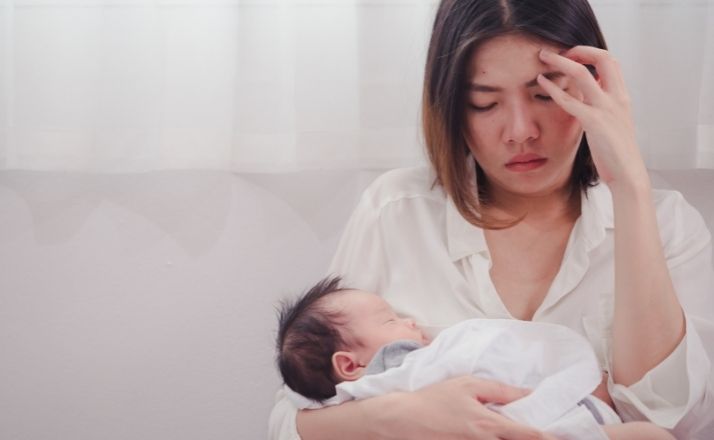The postpartum period is a whirlwind for new moms. There’s sleep deprivation, feeding challenges, and dramatic hormonal shifts — to say nothing of the physical recovery from delivery. All of that can add up to a challenging time. But what if you’re also having intrusive thoughts postpartum?
Please remember: this article is not providing medical advice, only information. If you have medical questions or need medical advice, see your provider right away.
What are intrusive thoughts?
According to IESO Digital Health, intrusive thoughts are
“unwanted thoughts that can pop into our heads without warning, at any time. They’re often repetitive – with the same kind of thought cropping up again and again – and they can be disturbing or even distressing.”
Intrusive thoughts aren’t limited to the postpartum period. Anyone can experience them at any point in time. However, these thoughts are a common occurrence in the postpartum period.
Postpartum intrusive thoughts tend to center around the baby and his or her well-being. In an article for Psychology Today, Hannah Reese, PhD, recounts her own postpartum experience:
“I am a new mother. I adore my son. He is beautiful and sweet and playful. And, when he was younger, I couldn’t stand at the top of my stairs without imagining myself dropping him down the stairs and seeing his tiny, helpless body writhing in pain. Scary image? Yes. Normal? Yes.”
Are intrusive thoughts normal?
Intrusive thoughts can be a normal part of the postpartum period. Some recent studies suggest as many as 90% of new mothers experience them.
New mothers are primed with a lot of hormones and, biologically, some anxiety is to be expected. In fact, a reasonable level of anxiety serves a purpose: it’s your brain’s way of trying to keep your baby safe.
However, intrusive thoughts can also be a sign of a more serious postpartum problem.
These thoughts can interfere with your everyday life. They can significantly increase the chances that a woman will be diagnosed with postpartum depression (PPD). According to the American College of Obstetricians and Gynecologists, PPD is a mood disorder characterized by “intense feelings of sadness, anxiety, or despair that prevent [the mother] from being able to do their daily tasks.”

How to cope and when to seek treatment
Understanding that intrusive thoughts can be a normal part of postpartum life can help you cope. Similarly, having the support of a loving partner or friend can also be beneficial.
Experts recommend trying not to dwell on intrusive thoughts. Instead, recognize them for what they are — an unwelcome intrusion, not a reflection of your love or abilities as a parent — and attempt to shift your focus.
But if you can’t escape these disturbing thoughts or they’re interfering with your day-to-day life, you need to let your doctor know.
If you ever have thoughts of harming your baby or yourself, seek medical attention right away.
Your doctor can help you, but first, they have to know what’s going on.
The postpartum period can be a challenging time. If you’re struggling with intrusive thoughts, don’t be afraid to reach out for help.











